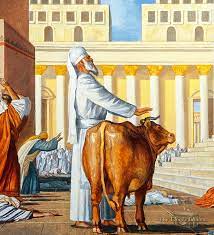Confessions Over the Bull
16: 6
Confessions over the bull DIG: Why do you think ADONAI chose animal sacrifices to reconcile the differences between unholy people and a holy God? Why wasn’t it enough? Why is that “without the shedding of blood there is no forgiveness for sin” (Hebrews 9:22)?
REFLECT: Is there anything that has become a “holy cow” in your life? How can you get back to worshiping the “holy Messiah?” What is the difference between external and internal cleansing in your life? Do you know someone who needs to hear this? Who can you help?
Aaron is to present the bull for the purification offering which is for himself
and make atonement for himself and his household.

In the morning of the Day of Atonements (to see link click Cq – The Day of Atonements), the high priest immersed himself in the mikveh for the first time. He put on the regular clothing of the high priest (Exodus 28:6-38), and carried out the morning continual ‘olah offering (see Ao – ‘Olah Offering). He then immersed again and put on simple, white linen garments. After dressing, he laid his hands on the bull for his purification offering (see Al – The Purification Offering). Aaron is to present the bull for the purification offering which is for himself and make atonement for himself and his household (16:6). The sacrifice of the bull removed all hindrances between the high priest and YHVH so that he could perform the offerings on behalf of the people.
This is the first occurrence of the Hebrew verb kaphar in Leviticus 16. It is a verb from noun kopher, meaning to cover over, pacify, or to make propitiation for. Propitiation is the averting God’s wrath by means of a vicarious (substitutionary) and efficacious (producing the desired effect) sacrifice (death), foreshadowing the Messiah (the atonement). It is the work of Messiah which satisfies every claim of God’s holiness and justice so that YHVH is free to act on behalf of sinners.
The verb kapher can be seen in Genesis 6:14 where Ha’Shem told Noah to make an ark and cover it with pitch (kaphar) both outside and inside. In addition, when Moshe’s mother Jochebed could not hide him any longer, she and her husband defied Pharaoh’s decree and hid the baby (Acts 7:17-20). She got a papyrus basket for him and coated it with tar and pitch (2:3a). The Hebrew word for basket used here is the same word translated ark in Genesis 6:14. It was coated with tar and pitch just like Noah’s ark was and it was built for floating, just like Noah’s ark. The Hebrew word for pitch is kaphar, and translated atonement elsewhere in the Bible.
According the Mishnah, while laying his hands on the head of the bull, he made the following prescribed confession, “I beg You, YHVH, forgive me now the wicked acts, rebellions and sins, for I have acted wickedly, rebelled and sinned before You, I and my household, as it is written in the Torah of Your servant Moses, ‘For it is on this day that atonement shall be made for you to cleanse you; you will be clean from all your sins before YHVH (Yoma 3.8, quoting Leviticus 16:30). Other confessions of sin in the TaNaKh may be found in Ezra 9; Nehemiah 1:5-11; Dani’el 9, and Psalm 106.
In the Second Temple Jewish custom, the high priest’s Yom Kippur confessions were the only time of the year that the Divine Name was pronounced audibly and clearly. The assembled worshippers in the Temple courts could prostrate themselves as they heard the Divine Name audibly uttered and they would exclaim together, “Blessed be the Name of the Glory of His Kingdom forever and ever” (Yoma 3.8).276
Dear Heavenly Father, May your name be forever blessed! The gift You offered, redemption thru the blood of Your Son, was such a costly gift! For if by the one man’s transgression, death reigned through the one, how much more shall those who receive the overflow of grace and the gift of righteousness reign in life through the One, Messiah Yeshua (Romans 5:17). May the great pain and shame that You suffered for us be branded on our minds that we do not take lightly your precious gift, but that we long with every thought to please You in all we think, say and do.
It is such a wonderful privilege to have You as our Heavenly Father, who is always by our side to help, protect and to guide us. For God Himself has said: I will never leave you or forsake you (Hebrews 13:5c). It is a joy to know that our eternal happiness in heaven cannot be compared with our temporary trials on this earth. For I consider the sufferings of this present time not worthy to be compared with the coming glory to be revealed to us (Romans 8:18). Also, what comfort to know that as we surrender every detail of our lives to you, our wise and wonderful Heavenly Father, You work out all things in our lives out to bless us and to glorify Your great name. Now we know that all things work together for good for those who love God, who are called according to His purpose. (Romans 8:28). We delight in blessing Your great name by our worship and obedience! In Yeshua’s holy name and power of His resurrection. Amen



Leave A Comment